新概念英语第一册91-92课
(完整版)新概念第一册Lesson91-92
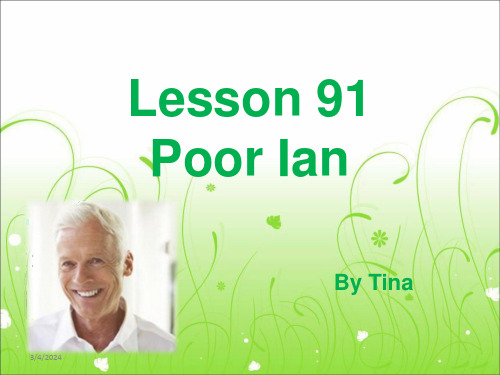
come to work→work等
• 现在完成时可表示持续到现在的动作或 状态,动词一般是延续性的,如
• live, teach, learn, work, study, know.
• 过去时常用的非持续性动词有: • come, go, leave, start, die, finish,
become, get married.
特疑词+ have (has)+主语+p.p?
(2) 表示动作发生在过去某个不确定的时间, 但对现在留下了某种影响和结果。 常被just、already、yet 等副词修饰。
-Have you had lunch yet? 你(已经)吃午饭了吗? -Yes, I have. I‘ve just had it. 我刚刚吃过。(现在我不饿了)
(强调动作,过程)
move out (of) 搬出来
move away
搬走
move from…to…
从…搬到…
②感动,打动
This story moved me. 这个故事感动了我。 The news moved him very much. 这消息使他很感动。
Байду номын сангаас
★ miss [mis] v. 想念,思念
★ person ['pə:sən] n. 人
He is a nice/good person. 他是个好人。 in person 亲自,直接的 He will go to get the money in person. 他将亲自去取钱。
★ personal adj. 个人的,私人的
['pə:sənəl]
• The patient is lying still. • 病人安静地躺着。
新概念英语第1册第91-92课课重点语法

新概念英语第1册第91-92课课重点语法第91-92课的内容:一、重要句型或语法1、一般将来时表示将来会发生的动作或状态,形式为will do,如:He will come here tomorrow./ They will be in Shanghai next week.二、课文主要语言点Has Ian sold his house yet? Yes, he has. 1)可简单复习一下现在完成时的内容。
2)注意人名Ian的发音He sold it last week. 1)可提问学生为什么此处动词要用一般过去时。
2)注意sell的过去式和过去分词都是sold。
Has he moved to his new house yet? No, not yet. 1)注意对比本句中的move to(搬到)和下文中的move into(搬进,要接宾语)和move in(搬进,不接宾语)的区别。
2)not yet,还没有。
He's still here. He's going to move tomorrow. 可复习be going to do的用法,同时对比与will do的区别:be going to do侧重表达主观打算或意愿。
When? Tomorrow morning? No. Tomorrow afternoon. 两个问句都采用了简略形式,因为口语中往往无需重复上文已经明确的信息,回答也采用简略形式。
完成问句应该是:When is he going to move? Is he going to move tomorrow morning?I'll miss him. 注意提醒will do的缩略形式:'ll do。
He has always been a good neighbour. 本句话可以作为常用句型识记运用:sb. has always been a good ...。
新概念英语第一册91-92课笔记.doc
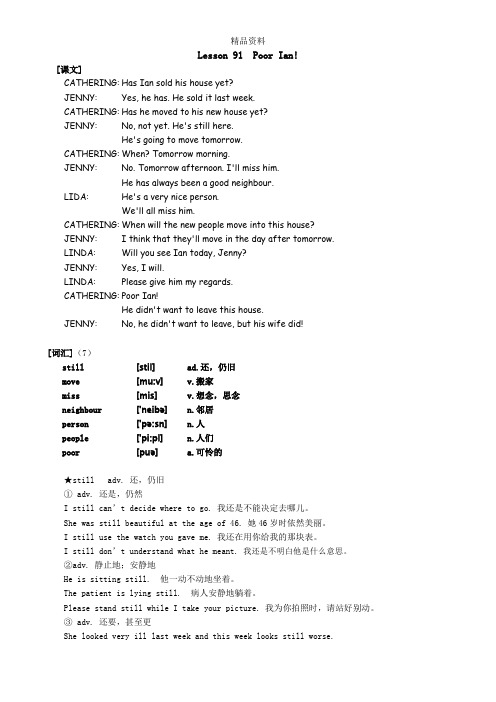
Lesson 91 Poor Ian![课文]CATHERING: Has Ian sold his house yet?JENNY: Yes, he has. He sold it last week.CATHERING: Has he moved to his new house yet?JENNY: No, not yet. He's still here.He's going to move tomorrow.CATHERING: When? Tomorrow morning.JENNY: No. Tomorrow afternoon. I'll miss him.He has always been a good neighbour.LIDA: He's a very nice person.We'll all miss him.CATHERING: When will the new people move into this house?JENNY: I think that they'll move in the day after tomorrow.LINDA: Will you see Ian today, Jenny?JENNY: Yes, I will.LINDA: Please give him my regards.CATHERING: Poor Ian!He didn't want to leave this house.JENNY: No, he didn't want to leave, but his wife didstill [stil]ad.还,仍旧move [mu:v]v.搬家miss [mis]v.想念,思念neighbour ['neibə] n.邻居person ['pə:sn] n.人people ['pi:pl] n.人们poor [puə] a.可怜的★still adv. 还,仍旧① adv. 还是,仍然I still can’t decide where to go. 我还是不能决定去哪儿。
Lesson91-92课件新概念英语第一册
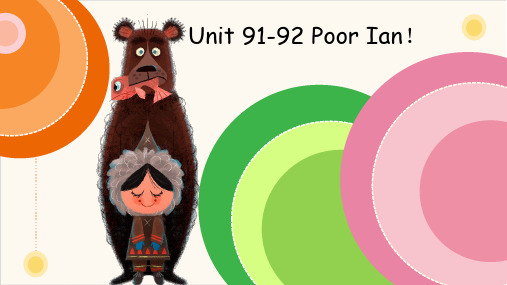
❌变否定
1.I will improve my writing skills. I won’t improve my writing skills.
2.He will go to the market tomorrow. He won’t go to the market tomorrow.
be going to
will do
be going to 使用的两种情况:
2.表示事先经过考虑, 安排好打算要做的事情。
如果出现计划、打算一般 都用be going to .
I am going to watch a film.
1.表示根据目前某种迹象 判断,某事非常有可能发生。
will 使用的三种情况:
It is Friday today.
It will be
Saturday tomorrow.
It will be rainy tomorrow.
adj.
She will be at home.
prep.
She will be 12 years old .
n.
be It will
rainy. 当句中没有实义动词时,我们需要在will 后加be动词,
1.表示单纯的 未来"将要", 通用各个人称.
They will go to visit the factory tomorrow.
2.表示不以人的 意志为转移的 自然发展的未 来的事。
He will be thirty years old this time next year.
3.问对方是否愿意 做某事或表示客气 地邀请或命令.
新概念英语第一册91-92课
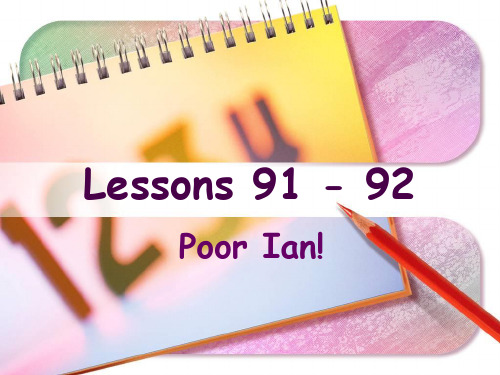
Poor Ian!
New words and expressions
still adv. move v. miss v. neighbour n. person n. people n. poor adj.
还,仍旧 搬家 想念,思念 邻居 人 人们 可怜的
引导宾语从句的关联词有从属连词,疑问代词, 疑问副词,缩合连接代词,缩合连接副词等。
Grammar--宾语从句
I am afraid that you can't see him today. 我恐怕你今天见不到他。 (关联词是从属连词that)
在非正式文体中关联词that常被省去。 eg:I hope you can come tomorrow. 我希望你明天能够来。 (that省略)
JENNY:
No, not yet. He's still here. He's
going to move tomorrow.
move to 搬家到... eg:All her family have moved to the US.
她全家人都已经搬到美国去住了。
完整的回答: He hasn't moved to his new house
1)一般将来时表示将来某一时刻的动作、状态以 及打算。该时态一般与表示将来意义的时间状语 连用。
tomorrow this month the day after tomorrow next week in two days' time from now on in the future
Grammar--宾语从句
用作宾语的从句叫做宾语从句,即充当宾语成份 的不是一个单词或词组,而是一个句子。
新概念课堂笔记第一册Lesson91-92

新概念英语课堂笔记第一册Lesson 91-92Word Studystill【用法】adv. 还,仍旧;还要,甚至更;静止地adj. 静止的,不动的;寂静的【例句】I still don’t understand what he meant. 我还是不明白他是什么意思。
She was still beautiful at the age of 46. 她46岁时依然美丽。
It was hot yesterday, but it’s still hotter today. 昨天很热,然而今天甚至还要热些。
She looked very ill last week and this week looks still worse. 上星期她看上去病的很厉害,而这个星期看来更不行了。
He is sitting still. 他一动不动地坐着。
The patient is lying still. 病人安静地躺着。
The doctor asked me to keep still. 医生叫我不要动。
How still everything is! 一切是多么寂静啊!The night was very still. 那天晚上很宁静。
move【用法】v. 搬家;搬动,移动;使感动【词组】move to 搬到……move sth. away 搬开;移走move on 朝前走;继续移动move about 走来走去move in 迁入move out 迁出【扩展】movement n. 移动;搬动;运动;活动movable adj. 可移动的moved adj. 感动的moving adj. 令人感动的,感人的【例句】The Smiths are going to move to New York. 史密斯一家打算搬到纽约去。
They moved into the new house last month. 他们上个月搬进了新家。
新概念英语第一册第91-92课ppt课件
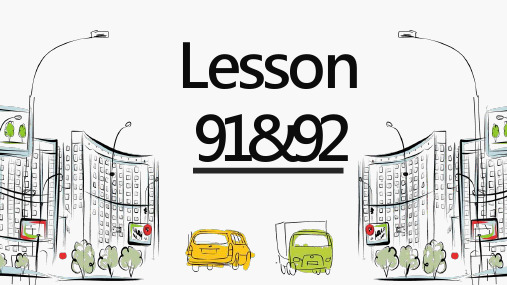
6
★neighbour
n. 邻居
neighbourhood
n.四邻,邻近地区
这一带很安静。
This is a quiet neighbourhood.
他要搬到这一带。
He is moving into the neighbourhood.
in the neighbourhood of
10
rain snow leave get up arrive finish work have a holiday drive home
have a haircut telephone me have a shave pack his bags sweep the floor paint this room repair my car
He’s still here.
将来时的时间状语
He’s going to move tomorrow.
be going to 打算做某事
25
将来时的时间状语
CATHERING: When? Tomorrow morning?
JENNY:
No. Tomorrow afternoon.
I'll miss him. 思念,想念 错过
make an appointment
11
02
Practice
12
• still • move • miss • neighbour • person • people • poor
v. 想念,思念 n. 邻居 adv. 还,仍旧 v. 搬家 n. 人 adj. 可怜的 n. 人们
13
03
Game Time
新概念英语第一册91-92课-完整ppt

OK,has Ian sold his house?Maybe yes,maybe no,has he moved to a new house? Now let`s listen to the audio and see if you can answer the question"Who wanted to sell the house?"
Lesson 91Poo源自 Ian本课内容• 单词学习 • 课文讲解 • 练习 • 日常用语 • 作业
Episode
If your father wants to go to the cinema,your mother wants to go shopping,what will they do?
• ★person n.(强调个体,不分男女老少,有复数persons) • The person in a hat is my father.
• ★people n.(强调集体,是集合名词) • How many people are there in your family? • person • n. 人
• He is sitting still. • 他一动不动地坐着。 • 病人安静地躺着。
• The patient is lying still.
• ★move v. 搬家;感动 • 这个故事感动了我。
• This story moves me. • move to 搬到……地方 • move in 搬进 • move out 搬出来 • move away 搬走 • 我们下个月将搬到乡下
- 1、下载文档前请自行甄别文档内容的完整性,平台不提供额外的编辑、内容补充、找答案等附加服务。
- 2、"仅部分预览"的文档,不可在线预览部分如存在完整性等问题,可反馈申请退款(可完整预览的文档不适用该条件!)。
- 3、如文档侵犯您的权益,请联系客服反馈,我们会尽快为您处理(人工客服工作时间:9:00-18:30)。
一般将来时
• • • • • • • What will… he’ll / she’ll / it’ll/ he’ll When will… What will you do tomorrow? When will you leave? 你后天打算去学校干嘛啊? 你什么时候出发? 注意在翻译时要与表示将来的时间状语连 用。
想念, ★miss v. 想念,思念 想念, ① v. 想念,惦念 • 我想你 • I missed you.
• I’ll miss him. = I will miss him ’ • I miss home very much. I miss you because I missed you.
12/11/2011
翻译下列句子
• 请代我向你家人问好!Please give your family my regards • 他昨天没来,是吗?是的,他没来。/不,他来了的。He did not come here yesterday, did he? • No, he didn’t/yes. He did. • 你明天做什么?What are you going to do tomorrow? • 我要去踢球。I am going to play football • 你去哪儿啊?Where are you going? • 我去看看我的老师。I am going to visit my teacher. • 我和Tom都会想念你的。Tom and I will miss you.
• Please give him my regards. give sb. sth. = give sth. to sb. 给某人某物 =把某物给某人 把某物给某人 请代我们问候你的父母 Please give your parents our regards. Please give our regards to your parents. • Poor Ian! 同情某人时的常用语。 同情某人时的常用语。
12/11/2011
shall,Will的用法
• 在表达将来要发生的事情时,通常要用到 shall和will, shall一般与第一人称连用,will 一般与第二和第三人称连用,但是现在已 经很少用到shall了,大家都被美语同化了, 不论人称都用will。 • I will go to school tomorrow. • My husband and I will both miss him. 当人数 超过一人时,will后面要加both, 表示都是。
Lesson 91-Lesson 92
Poor Ian
单词学习
• • • • • • • still move miss neighbour person people poor adv. 还,仍旧 v. 搬家 v. 想念,思念 想念, n. 邻居 n. 人 n. 人们 adj. 可怜的
★still adv. 还,仍旧 还是, ① adv. 还是,仍然 • 我仍然不知道他是什么意思。 我仍然不知道他是什么意思。 • I still don’t understand what he meant. ’ 还要, ② adv. 还要,甚至更 • 她上周看起来病得很严重,这周更严重了。 她上周看起来病得很严重,这周更严重了。 • She looked very ill last week and this week looks still worse. 静止地; ③ adv. 静止地;安静地 • He is sitting still. • 他一动不动地坐着。 他一动不动地坐着。 • 病人安静地躺着。 病人安静地躺着。 • The patient is lying still.
• He’s going to move tomorrow. ’ be going to do 计划、打算做某事。 计划、打算做某事。
• He has always been a good neighbour. 现在完成时 指Ian自从在这住开始到现在一直都很好 自从在这住开始到现在一直都很好 • He’s a very nice person. ’ 表达人的人品很好可以用good或nice。 或 。 表达人的人品很好可以用 person 强调的个体的人,可以有复数形 强调的个体的人, 式persons people 通常是人的统称。 通常是人的统称。
• When will the new people move into this house? move to = move into 搬进 people = neighbours 她是这个职位的合适人选。 她是这个职位的合适人选。 She’s the right person for this job. ’ 公园里有很多人。 公园里有很多人。 There’re a lot of people in the park. ’
• • • • • ຫໍສະໝຸດ • • •搬家; ★move v. 搬家;感动 这个故事感动了我。 这个故事感动了我。 This story moves me. move to 搬到 地方 搬到……地方 move in 搬进 move out 搬出来 move away 搬走 我们下个月将搬到乡下 We'll move to the country next month.
12/11/2011
一般将来时
• 一般将来时表示将来某一时刻的动作或状 态,或将来某一段时间内经常的动作或状 态。常常和表示将来的时间状语连用。如: tomorrow(明天), next week(下周), from now on(从现在开始);in the future (将来)等。 一般将来时由助动词shall (第一人称),will(第二、三人称) 动词 原形构成。美国英语则不管什么人称,一 律用will。
• -He didn’t want to leave this house. ’ • -No, he didn’t, but his wife did! ’ 第二个句子是对第一个句子的证实,这里不 可以按照中文习惯去赞同别人的说法,而 是要根据事实来说,因此回答no, he didn’t want to leave. 但是翻译成中文的时 ’ 候要说,是的,他不愿意离开。 eg: He didn’t go to school last week, did he? : ’ No, he didn’t. 是的,他没去。 ’ 是的,他没去。 Yes, he did. 不,他去了的。 他去了的。 • 注意没有混搭形式:Yes, he didn’t. / No, 注意没有混搭形式: ’ he did.
错过; ② v. 错过;未做到 • 他睡过了头,错过了他那班火车。 他睡过了头,错过了他那班火车。 • He overslept and missed his train. • 我错过了一个可能实现自己梦想的机会。 我错过了一个可能实现自己梦想的机会。 • I missed an opportunity of realizing my dream.
12/11/2011
课文讲解
• -Has he moved to his new house yet? • -No, not yet. Move to 搬到 搬到… • 我明天要搬到 区的办公室。 我明天要搬到B区的办公室 区的办公室。 • I’ll move to the office in zone B ’ tomorrow. Yet用于疑问句和否定句的句尾。 用于疑问句和否定句的句尾。 用于疑问句和否定句的句尾 • No, he has not moved to his new house yet.
